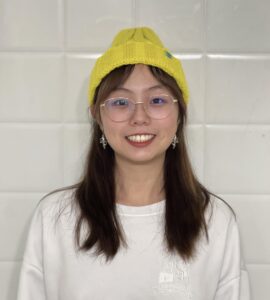 Hi everyone! My name is Tianyi Li, an international student from Liaoning, China. I am currently a senior double majoring in psychology and statistics. My passion for improving the psychological well-being of children and adolescents with adverse experiences began in high school. Back then, I spent plenty of time interacting with kids and teenagers from various disadvantaged backgrounds through volunteering. However, the more I learned about their situations, the more helpless I felt. I realized the limitation of short-term volunteering and the importance of professional knowledge in addressing more essential issues such as mental health problems.
Hi everyone! My name is Tianyi Li, an international student from Liaoning, China. I am currently a senior double majoring in psychology and statistics. My passion for improving the psychological well-being of children and adolescents with adverse experiences began in high school. Back then, I spent plenty of time interacting with kids and teenagers from various disadvantaged backgrounds through volunteering. However, the more I learned about their situations, the more helpless I felt. I realized the limitation of short-term volunteering and the importance of professional knowledge in addressing more essential issues such as mental health problems.
With this idea in mind, I chose psychology as my major during college and was lucky to join the Child Imaging Research on Cognition and Life Experiences (CIRCLE) Lab, which investigates how exposure to early adversity influences child brain development. Under the supervision of Dr. Margaret Sheridan, I have developed and conducted several independent projects investigating the relationship between parenting, adversity, and child psychological disorders. Most recently, I am working on my honor thesis project, which examines the influences of preschool parenting behaviors on adolescent psychopathology and the moderating role of exposure to early adversity. These experiences not only enriched my knowledge about how adversity impacts children’s and families’ well-being, but also inspired me to think about how the theoretical findings can be applied to solving real-world issues. Therefore, in order to gain more insights into the practical side, I interned as counselor assistant at a counseling clinic, where I was responsible for scheduling appointments, conducting initial interviews, and following up with clients to respond to their requests. In addition, I also received training and volunteered as peer counselor providing mental support for peers through online texting, and as hotline receptor for a non-profit organization dedicated to eradicating gender-based violence in the Asian American community. While actually working with people in need of mental health support, I further confirm how much I enjoy the feeling of being empowered while empowering others and have thus made up my mind to become a mental health professional in the future.
Joining the Gil Internship Program has taken me one step closer to the lifelong goal. I am greatly honored to work as a clinical intern at the UNC Community Clinic, which is dedicated to providing affordable psychological services to the Triangle community and providing high quality training for graduate students in the UNC Clinical Psychology Ph.D. program. During my time here, I directly work with the director of the clinic, Dr. Jen Youngstrom. I am responsible for a wide variety of tasks, including desk duty, checking voicemail messages from interested clients, and keeping track of space usage data. Additionally, for the first two months of my internship, the major project I have been working on is checking and editing assessment templates so that they are up-to-date, aesthetic, and user-friendly. All the updated templates have now been put into use at the clinic, which gives me a strong sense of achievement. Following that project, I am recently assigned with a new project of sorting and organizing video clips of therapy sessions based on treatment approach and client type. Both projects have exposed me to valuable knowledge in the field of clinical psychology. I’m glad that my internship here has enabled me to make contributions to the clinic while exploring topics and absorbing knowledge that I’m truly passionate about.
Besides the tasks assigned to me, Dr. Youngstrom is also extremely supportive in tailoring my internship experience based on my own interest. As I request to get more involved in the clinical practice, she allows me to sit in at the weekly assessment practicum and case presentations where graduate students present on cases they are currently working with and share their thoughts and experiences. What’s more, with the approval of Dr. Youngstrom, I gain the opportunity to shadow phone screening and in-take calls conducted by the clinic teaching fellow. Collectively, my internship experience at the UNC Community Clinic has been incredibly interesting and beneficial for my future development. I’m able to learn about not only how a university-based clinic operates but also what the life of clinical psychology Ph.D. students look like, which helps me confirm my dream of pursuing a Ph.D. in clinical psychology after graduation. In addition to improving my skills and knowledge, I also get to know many friendly graduate students who are willing to guide me through the process of looking for jobs and applying for graduate programs in the future. These connections are invaluable for my future career development.
Together, I really appreciate the opportunity of becoming a Giller and interning at the UNC Community Clinic. I am extremely thankful for the guidance and support from my mentor Dr. Youngstrom, professor Dr. Buzinski, and our program manager Emily. The skills and knowledge I have gained from this experience will definitely benefit me along my career path.
